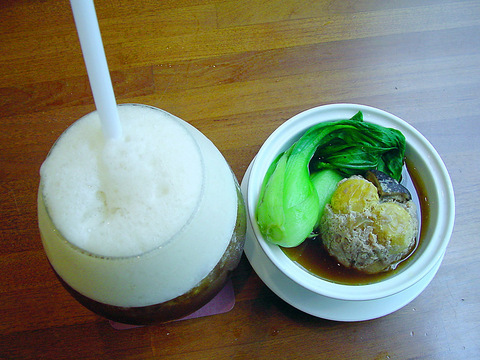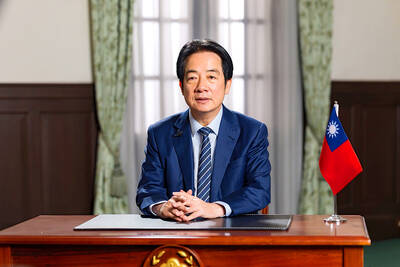It is believed that Taiwan's tea-drinking culture started in Taichung and Chun-shui Tang is a popular place for people to hang out and drink tea, or take a simple meal or snack at the same time.
The tea house has come up with quite a few cool inventions in the past such as foam black tea and pearl cream tea, that were first introduced to the Taiwan public, in 1983 and 1987 respectively. The pearl cream tea mixed by Chun-shui Tang is still considered unbeatable, however, and Chun-shui Tang is now operating as a chain store, having spread to the major cities and based itself in Taichung.
The tea house located by International Street near the Tunghai University campus is unique because it is in a street lined with artefact shops, boutique stores and gourmet restaurants. It is a one-way street and is usually packed with people during the weekends, and in the evenings on most weekdays when the university faculty and students come to patronize their favorite restaurants.

PHOTO: DEREK LEE, TAIPEI TIMES
Most of the tables in the tea house are arranged to lean against a large beautifully-shaped glass window through which sunlight filters through fine bamboo curtains. Little potted plants and elegant flower arrangements at every turn are pleasing to the eyes and create a good mood. The second-floor interior and teak-wood furniture of the place gives visiting guests the idea of a traditional Taiwanese tea house, yet with a modern and clever twist.
Best of all the food served with the teas is generally good, with a refined taste. The square-shaped brown sugar teacake introduced last year proved to be a knock-out for its smooth taste. It is a bit sweet at first bite. Yet, with a sip of the tea, the taste in your mouth turns and make the tea flavor much more fragrant.
If you care for a simple repast, the set meal of ground-pork with pickle is probably the best bet. The dish is served in a chinaware bowl with steamed meatballs mixed with thick sliced black mushrooms and egg yolk. Green vegetables are served on the side. The soup goes well with the white rice. The side dish of daikon pickles is neither hot nor salty.
Furthermore, your side order of tea -- either oolong, jasmine or another kind, with ice or hot -- always comes with extra-large cups or a teapot and will add to the satisfaction of the meal. -- Derek Lee

This month the government ordered a one-year block of Xiaohongshu (小紅書) or Rednote, a Chinese social media platform with more than 3 million users in Taiwan. The government pointed to widespread fraud activity on the platform, along with cybersecurity failures. Officials said that they had reached out to the company and asked it to change. However, they received no response. The pro-China parties, the Chinese Nationalist Party (KMT) and Taiwan People’s Party (TPP), immediately swung into action, denouncing the ban as an attack on free speech. This “free speech” claim was then echoed by the People’s Republic of China (PRC),

Exceptions to the rule are sometimes revealing. For a brief few years, there was an emerging ideological split between the Democratic Progressive Party (DPP) and Chinese Nationalist Party (KMT) that appeared to be pushing the DPP in a direction that would be considered more liberal, and the KMT more conservative. In the previous column, “The KMT-DPP’s bureaucrat-led developmental state” (Dec. 11, page 12), we examined how Taiwan’s democratic system developed, and how both the two main parties largely accepted a similar consensus on how Taiwan should be run domestically and did not split along the left-right lines more familiar in

Many people in Taiwan first learned about universal basic income (UBI) — the idea that the government should provide regular, no-strings-attached payments to each citizen — in 2019. While seeking the Democratic nomination for the 2020 US presidential election, Andrew Yang, a politician of Taiwanese descent, said that, if elected, he’d institute a UBI of US$1,000 per month to “get the economic boot off of people’s throats, allowing them to lift their heads up, breathe, and get excited for the future.” His campaign petered out, but the concept of UBI hasn’t gone away. Throughout the industrialized world, there are fears that

The Democratic Progressive Party (DPP) controlled Executive Yuan (often called the Cabinet) finally fired back at the opposition-controlled Legislative Yuan in their ongoing struggle for control. The opposition Chinese Nationalist Party (KMT) and Taiwan People’s Party (TPP) acted surprised and outraged, but they should have seen it coming. Taiwan is now in a full-blown constitutional crisis. There are still peaceful ways out of this conflict, but with the KMT and TPP leadership in the hands of hardliners and the DPP having lost all patience, there is an alarming chance things could spiral out of control, threatening Taiwan’s democracy. This is no